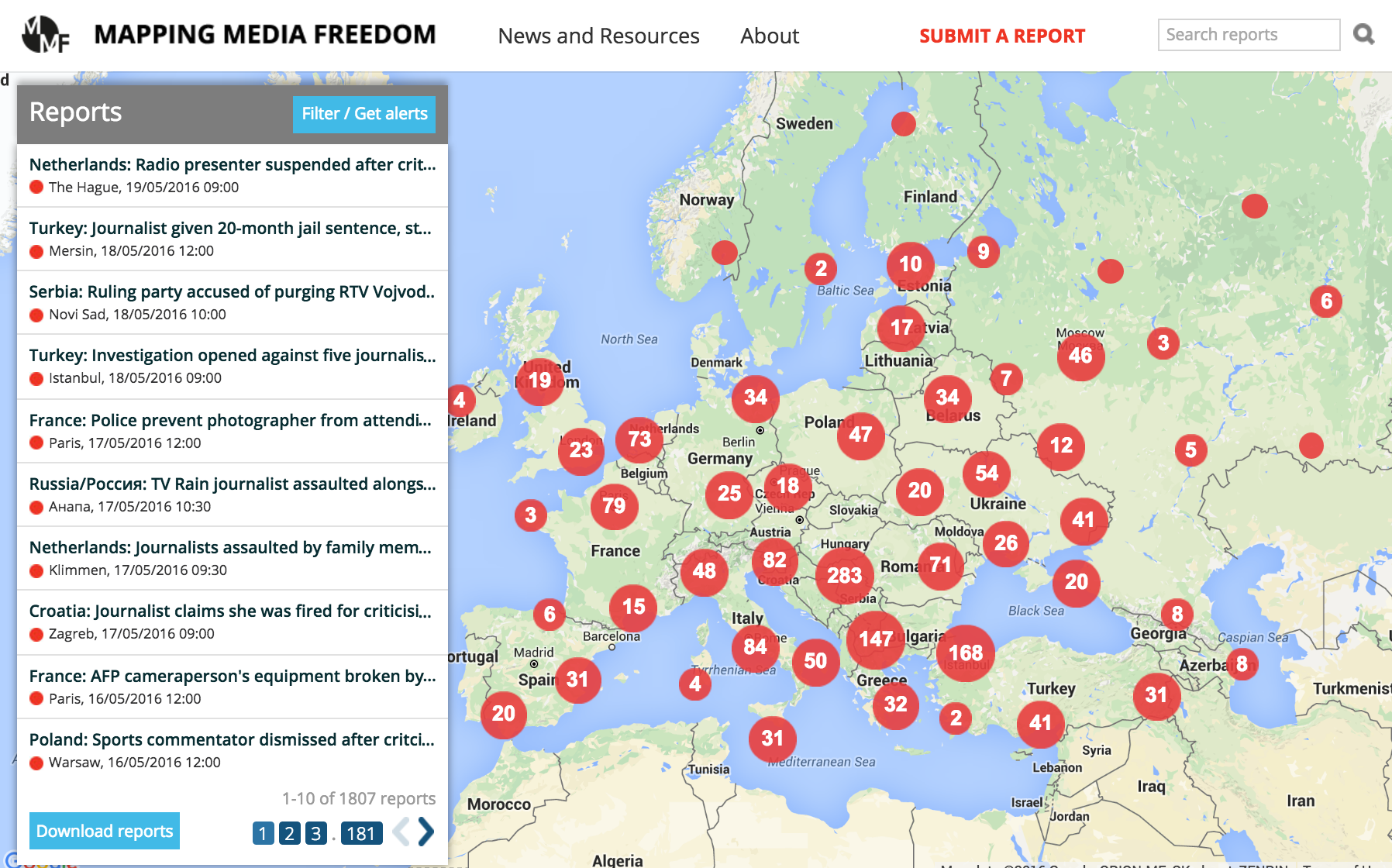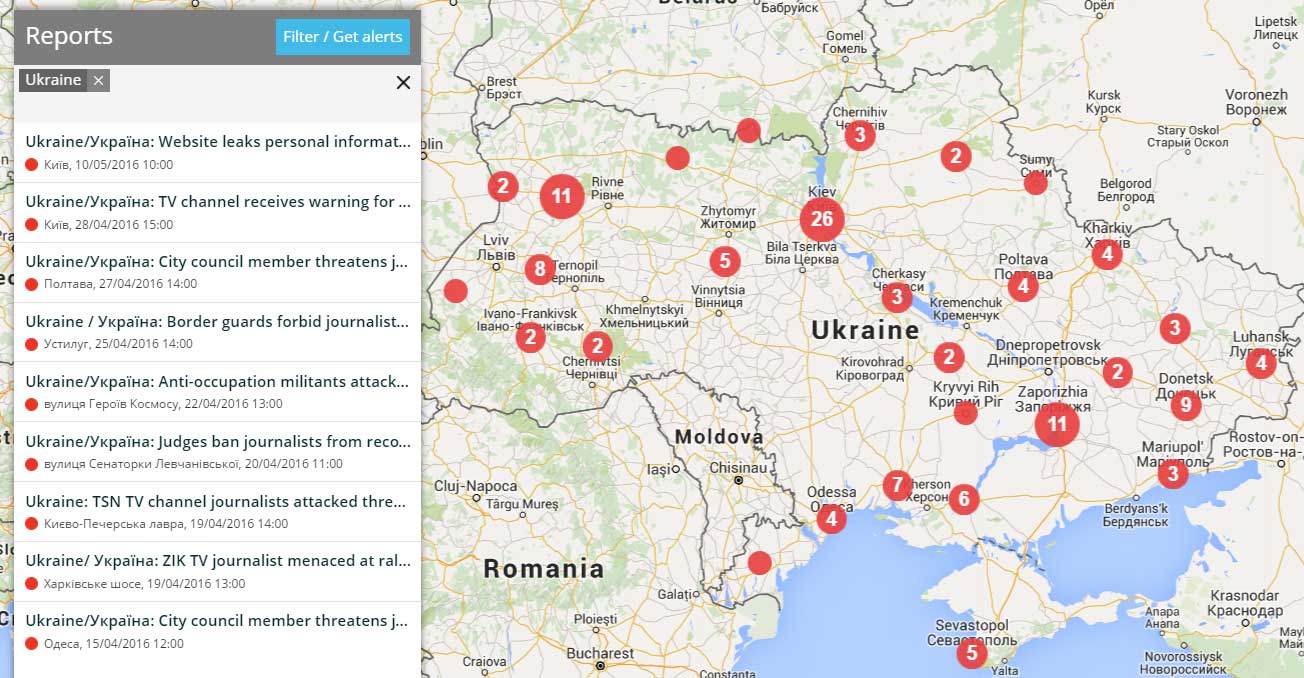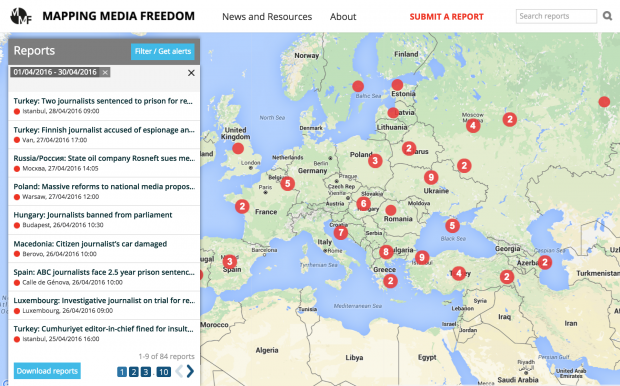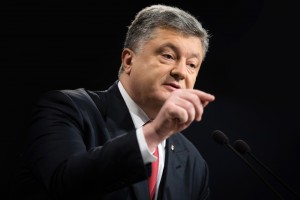24 May 2016 | Azerbaijan, Azerbaijan News, Belarus, Belgium, Bosnia, Croatia, Europe and Central Asia, France, Germany, Greece, Index Reports, Macedonia, Mapping Media Freedom, mobile, News, Poland, Serbia, Spain, Turkey, Ukraine

Mapping Media Freedom launched to the public on 24 May 2014 to monitor media censorship and press freedom violations throughout Europe. Two years on, the platform has verified over 1,800 media violations.
“The data the platform has collected over the last two years confirms that the state of press freedom across Europe is deplorable,” said Hannah Machlin, project officer for Mapping Media Freedom. “Media violations are occurring regularly in countries with strong democratic institutions and protective laws for journalists. Legislation limiting the press, violence across the continent and authoritarian governments are also fuelling this rapid and worrying decline. We hope that institutions and leaders take note of this information and take action swiftly.”
To mark the anniversary, we asked our correspondents to pick a key violation that stood out to them as an example of the wider picture in their region.
Russia / 113 verified reports
Several journalists and human rights activists attacked in Ingushetia
“The brutal attack on a minibus carrying six journalists and several human rights activists near the border between Ingushetia and Chechnya on the 9 March 2016 demonstrates the dangers faced by media professionals working in Russia’s North Caucasus. No suspects have been established so far. This case stands out due to its extreme violence but also supports a common trend: the reluctance of the local authorities to ensure that the journalists’ rights are respected.” – Ekaterina Buchneva
Italy / 190 verified reports
97 journalists accused of breaking the law in mafia investigation
“This was a very relevant investigation, with no precedent, that took place in October, a few weeks away from the start of the trial known as Mafia Capitale, which concerns the scandal that involved the government of the city of Rome. It is a collective intimidation because it involved 97 journalists, who were denounced for violating the secret on the ongoing investigations. It is a really serious form of intimidation because it was activated within the field of law and thus is not punishable.” – Rossella Ricchiuti
Turkey / 57 verified reports
Zaman newspaper seized by authorities
“These attacks and actions taken by the government against independent media in Turkey attest to the shrinking space of independent media overall. In addition, it illustrates the shifting power dynamic within the ruling government in Turkey where once upon a time friends, are turned into enemies by the regime. As the paper wrote itself, Turkey is headed through its ‘darkest and gloomiest days in terms of freedom of the press.'” – MMF’s Turkey correspondent
Azerbaijan/ 5 verified reports
Writer banned from leaving country
“Aylisl’s 12-hour interrogation at the airport and later charges of hooliganism were just as absurd as the claim that a 79-year-old man, suffering from a heart condition and other health issues would attack an airport employee to such an extent that it would cause hemorrhage. I chose this example to illustrate the absurdity of charges brought against individuals in Azerbaijan but also the extent to which the regime is ready to go in order to muzzle those voices who different.” – MMF’s Azerbaijan correspondent
Macedonia / 59 verified reports
Deputy Prime Minister attacks journalist
“This incident best demonstrates the division in society as a whole and among journalists as a professional guild. This is a clear example of how politicians and elites look upon and treat the journalist that are critical towards their policies and question their authority.” – Ilcho Cvetanoski
Bosnia / 56 verified reports
Police raid Klix.ba offices
“This was the most serious incident over the last two years in Bosnia regarding the state’s misuse of institutions to gag free media and suppress investigative journalism. In this specific incident, the state used its mechanisms to breach media freedoms and send a chilling message to all other media.” – Ilcho Cvetanoski
Croatia / 64 verified reports
Journalist threatened by disbanded far-right military group
“After the centre-right government in Croatia came to power in late 2015, media freedom in the country rapidly deteriorated. Since then around 70 media workers in the public broadcaster were replaced or removed from their posts. This particular case of the prominent editor-in-chief of the weekly newspaper Novosti receiving a threatening letter from anonymous disbanded military organisation demonstrates the polarisation in the society and its affect on media freedom.” – Ilcho Cvetanoski
Greece / 34 verified reports
Golden Dawn members assault journalists covering demonstration
“This was the second attack against journalists by Golden Dawn members within one month. With more than 50,000 asylum seekers and migrants trapped in Greece, the tension between members of the far-right group and anti-fascist organisations is rising.” – Christina Vasilaki
Poland / 35 verified reports
Over 100 journalists lose jobs at public broadcasters
“This report highlights the extent of the ongoing political cleansing of the public media since the new media law was passed in early January.” – Martha Otwinowski
Germany / 74 verified reports
Journalist stops blogging after threats from right-wing extremists
“The MMF platform lists numerous incidents where German journalists have been threatened or physically assaulted by right-wing extremists over the last two years. This incident stands out as a case of severe intimidation that resulted in silencing the journalist altogether.” – Martha Otwinowski
Belgium / 19 verified reports
Press asked to respect lockdown during anti-terrorism raids
“On 22 November 2015, the Belgian authorities asked the press to refrain from reporting while a big anti-terrorist raid was taking place in Brussels. While understandable, this media lock-down raised questions for press freedom and underlined the difficulties of reporting on terror attacks and anti-terror operations.” – Valeria Costa-Kostritsky
Luxembourg / 2 verified reports
Investigative journalist on trial for revealing Luxleaks scandal
“This Luxleaks-related case is the only violation we have become aware in Luxembourg over the period (which is not to say that no other cases occurred). Along with two whistleblowers, a journalist was prosecuted by PricewaterhouseCoopers and accused of manipulating a whistleblower into leaking documents. This is a good example of the threat the notion of trade secrets can represent to journalism.” – Valeria Costa-Kostritsky
Ukraine / 127 verified reports
Website leaks personal information of more than 4,000 journalists
“This incident shows how fragile the media freedom and personal data of journalists are in armed conflict. Even after a great international scandal, the site continues to break the legislation and publishes new lists. It has been operating for two years already and those involved in its activities go unpunished. It seems that the post-Maidan Ukraine has simply ‘no political will’ for this.” – Tetiana Pechonchyk
Crimea / 18 verified reports
Journalists’ homes searched, criminal case filed
“This report shows the everyday life of independent journalists working on the peninsula. Only a few critical voices are still remaining in Crimea while the majority of independent journalists were forced to leave the profession or to leave Crimea and continue their work on the mainland Ukraine.” – Tetiana Pechonchyk
Spain / 49 verified reports
Journalist fined for publishing photos of arrest
“The latest issue for the Spanish media is the Public Security Law, introduced in June 2015, which among other things limits space for reporters. The law prohibits the publication of photo and video material where police officers may be identified, unless official state permission is obtained. This was the first case of a journalist being fined by the new law.” – Miho Dobrasin
Belarus / 47 verified reports
Journalist beaten by police, detained and fined for filming police attacks
“The story has ended in impunity: a criminal case was not even filed against the police officers who had beaten the journalist.” – Volha Siakhovich
Latvia / 12 verified reports
Latvia and Lithuania ban Russian-language TV channels
“This was the beginning of a disturbing tendency to react with rather futile gestures against Russian television channels. The bans are not so much against the media, as telling the audience that the authorities, not the public, will decide what Latvian viewers may or may not see or hear.” – Juris Kaža
Serbia / 110 verified reports
Investigative journalists victim of smear campaign
“You have to be very brave to launch a new investigative journalism portal in Serbia and expose corruption and organised crime involving government officials. That is why the launch of KRIK in early 2015 has been so important for media freedom, but at the same time so dangerous for its journalists. Smear campaigns like this by pro-government tabloid Informer are a relatively new but common method in the Balkans to scare journalists off.” – Mitra Nazar
13 May 2016 | Digital Freedom, Mapping Media Freedom, mobile, News, Ukraine

Ukraine is again at the center of an international scandal. On 10 May Ukrainian website Myrotvorets, which publishes personal data of alleged separatists, made public information about the journalists who have been accredited in the so-called Donetsk People’s Republic (DPR) — the part of Donbas area beyond Ukraine’s government control.
The website, which announced on Friday 13 May that it was shutting down, leaked personal data of more than 4,000 journalists, including those working for BBC, Reuters, AFP, The Independent, Ceska televize, CNN, Bloomberg, Aljazeera, AP, Liberation, ITAR-TASS and other media.
The site published the names of the journalists, the media outlets they work for, country of origin, cell phones, email and dates of stay in the DPR.
Myrotvorets, or Peacemaker, received the data from Ukrainian hackers who had attacked DPR sites. After the data was illegally disclosed, the hackers declared a boycott and suspended their activities.
The website also accuses the journalists of co-operating with “militants of the terrorist organisation” and claims that “journalists with Russian names work for many non-Russian media (CNN? BBC? AFP?).”
Myrotvorets has long been raising concerns and criticism of Ukrainian human rights activists. Launched in the spring of 2014, it publishes the personal data of people its writers see as supporting separatism in Ukraine.
In particular, it had published the personal data of former Ukrainian lawmaker Oleh Kalashnikov and journalist Oles Buzyna. Both were murdered near their apartments shortly after the release of their information.
Breaking legislation on personal data protection and the presumption of innocence, the site has been operating for two years without any prosecution for its activities.
In April 2015, the Ukrainian parliament’s Commissioner for Human Rights Valeria Lutkovska demanded that the security service and the interior ministry block the website and prosecute those behind it. Instead, she received only threats in response.
As a result, Anton Herashchenko, the MP from the People’s Front faction and the advisor to the Ukrainian Interior Minister, who previously announced his involvement in the creation of Myrotvorets, threatened Lutkovska with dismissal. He said that operation of the website was “extremely important for the national security of Ukraine and the one, who does not understand this or attempts to hinder its operation, is either a puppet in the wrong hands or works against the national security” and the information is collected “exclusively from such open sources as social networks, blogs, online directories, news feeds”.
Lutkovska’s office of ombudsman told Mapping Media Freedom that the police launched a criminal case last year, but there are no tangible results yet and the website continues its work. The sites servers are located outside Ukraine.
In the wake of the publication of journalists’ information, Lutkovska again appealed to the interior ministry and security service aksing for the site to be blocked.
Journalists, whose personal data was published, have already received threats. Ukrainian freelance journalist Roman Stepanovych has published a threat he received via e-mail.
Stepanovych, who currently works mainly for Vice News, told Mapping Media Freedom: “I filmed in Donbas like a stringer for different news agencies like NBC, DW, Reuters and sometimes worked as a fixer for Die Ziet, CCTV, Aftenposten and many more. I am a native of Donetsk, but have always worked for the western media.“
Stepanovych, who is working outside Ukraine, said that he was considering asking police to investigate the threats when he returns to the country.
On May 11, journalists working for Ukrainian and foreign media issued a joint statement with Ukrainian and international media organisations demanding that Myrotvorets immediately take down the personal data of journalists, who had been accredited in the DPR:
“The Ukrainian and foreign journalists, who risked their lives to cover the events impartially and told what was happening in the occupied territories in Ukrainian and international media, were exposed to attack. In particular, it is thanks to their work we found out about the Vostok battalion, crimes of militant known as Motorola and other militants, supply of Russian weapons and many other important facts. These journalists gave information for a qualitative investigation into downing of MH17 flight in the summer of 2014, and their materials about senior officials of the occupied territories formed the basis of many investigative and analytical articles. We especially emphasise that accreditation does not mean and has never meant cooperation of journalists with any party to the conflict. Accreditation is a form of protection and safety of journalists.”
According to the Ukrainian and international media organisations, nearly 80 journalists were taken captive in 2014, many of whom suffered torture. Accreditation is the only, although minor, mechanism for protection of journalists from torture or captivity.
Lutkovska and the journalists also appealed to Ukrainian authorities asking for a launch of criminal proceedings. On the same day, the address of the European Union’s ambassador to the Ukraine, Jan Tombinski, was released. Tombinski said that publication of the journalists’ leaked personal data violated the best international practices and Ukrainian legislation. He urged Ukrainian authorities “to help ensure that this content is no longer published“.
In response, Anton Herashchenko posted on his Facebook page: “Currently, Ukraine has no lawful methods to block harmful content and has no principles of defining which content is illegal and harmful and which is not. Ukraine has also no technical possibility to block any content on the internet.”
On May 11, the Kyiv prosecutor’s office opened criminal proceeding under Article 171 of the Criminal Code of Ukraine (Preclusion of legal professional activities of journalists).
6 May 2016 | Belarus, Europe and Central Asia, Macedonia, Mapping Media Freedom, News, Russia, Turkey, Ukraine

April 2016 was the busiest month for Index on Censorship’s Mapping Media Freedom since the project began in May 2014, with a total of 87 violations against the media recorded. While MMF records violations from over 40 countries, the majority (55%) of last month’s violations came from just five countries.
These hotspots for attacks on the media will come as no surprise to anyone following the project in recent months.
Turkey continues to be the worst offender
With 16 violations recorded within its borders in April, Turkey is again the location with the most offences.
One of the most worrying occurrences last month was on 28 April when journalists Ceyda Karan and Hikment Chetinkaya, who work for Turkish daily Cumhuriyet, were sentenced to two years in prison for publishing the cover of Charlie Hebdo magazine featuring an image of prophet Muhammad. The pair were convicted of inciting “hatred and enmity”.
In another instance, on 30 April, Hamza Aktan, news director of private Istanbul-based IMC TV, was arrested by anti-terror police. Aktan was escorted to the police station where he was interrogated for 12 hours and then released. The editor is being accused of spreading propaganda for a terrorist organisation and trying to build public opinion abroad against interests of Turkey for four public tweets.
UPDATE: Government-seized Zaman and Cihan forced to close
Index on Censorship’s latest quarterly report includes a case study on an Istanbul court appointing a group of trustees to take over the management of Zaman newspaper. Since the report, it has been announced that Zaman and Cihan News Agency, also government-seized,
are to be permanently closed on 15 May. The decision comes the day after the European Commission recommendation of granting Turkey visa-free travel to the EU.
Russia: Big business throws its weight around
As the Panama Papers showed in April, investigative journalism is essential if misconduct and abuse by big business are to come to light. This makes a recent trend in Russia all the more worrying.
A total of 12 reports were filed in Russia last month, three of which related to journalists investigating business. On 12 April, when covering truckers protesting against the “illegal” actions of Omega, journalist Anton Siliverstov’s phone was stolen by Evgeni Rutkovski the director of the transport company. When he asked Rutkovski to comment on the protest, Siliverstov was forced from the office. The journalist said he would record the incident on his phone, at which point Rutkovski snatched the journalist’s device, refused to give it back and called security. Siliverstov hasn’t seen the phone since.
Two days later, reporter Igor Dovidovich was assaulted by the head of Gaz-Service, a gas company he was investigating. His TV crew was also attacked by the firm’s employees.
The month ened with state oil company Rosneft filing a judicial complaint against BiznessPress for an article which, the firm said, is “false and represents baseless fantasies of journalists or their so-called sources”.
Ukraine: TV journalists in the firing line
Ukraine continues to be unsafe for many media workers, with nine reports submitted to the project in April. Violations included five cases of intimidation, two attacks to property and several physical assaults. On 1 April, unidentified assailants set a local TV studio on fire with molotov cocktails. Studio equipment and furniture were destroyed. No one was injured.
Three days later, claims emerged that journalists working for TV channel 1+1 were under surveillance, have received death threats and have been assaulted. Later in the month, journalists from the station were attacked on 19 and 20 April.
Belarus: Journalism as a crime
Journalism is not a crime, but you’d be excused for thinking otherwise when observing recent events in Belarus. Seven reports were filed for Belarus last month, including two criminal charges resulting in fines, three arrests, and one journalist interrogated for doing his job.
On 15 April, freelance journalists were fined approximately €330 each for contributing to Polish TV channel. Kastus Zhukousky and Larysa Schyrakova were found guilty of illegal production and distribution of media products and for contributing to a foreign media outlet without accreditation.
Zhukouski has been fined seven times this year alone.
Macedonia: Anti-government protests turn sour
Six reports were submitted from Macedonia during April. The most worrying instances involved attacks to property (2) and a physical assault, leading to an injury.
April saw a wave of anti-government protests with thousands marching, mainly peacefully, through the capital city of Skopje. On 13 April four photographers and one journalist were injured by police during the anti-government demonstration. Two TV journalists were also injured by demonstrators on the day. On 14 April the offices of the Slobodna Makedonija radio station were pelted with stones by some anti-government demonstrators, causing the windows to break and other material damages.
Mapping Media Freedom Quarterly Report
Index on Censorship has released its report for the first quarter of 2016 covering 1 January and 31 March 2016. During this time: Four journalists were killed; 43 incidents of physical assault were confirmed; and there were 87 verified reports of intimidation, which includes psychological abuse, sexual harassment, trolling/cyberbullying and defamation. Media professionals were detained in 27 incidents; 37 criminal charges and civil lawsuits were filed; and media professionals were blocked from covering a story in 62 verified incidents.
“Conflict in Turkey and eastern Ukraine along with the misuse of a broad range of legislation — from limiting public broadcasters to prosecuting journalists as terrorists — have had a negative effect on press freedom across the continent,” Hannah Machlin, Mapping Media Freedom project officer, said.
19 Jan 2016 | Europe and Central Asia, Mapping Media Freedom, mobile, News, Ukraine

President of Ukraine Petro Poroshenko. Credit: Drop of Light / Shutterstock.com
Since October 2015, Index on Censorship’s Mapping Media Freedom project has recorded a total of 40 verified violations against press freedom in Ukraine, six of which took place in Crimea. Of these reports, 17 included a physical assault or an attack to property, showing just how unsafe the country is for many media workers. To break this number down further, seven violations were physical attacks on journalists only, six were solely damage to journalists’ property and four included a mix of both.
“State and non-state actors alike are undermining the freedom of the press in Ukraine, including Crimea,” Hannah Machlin, Index’s Mapping Media Freedom project officer, said. “Clashes in the eastern region of the country, along with blocked access to local government meetings, frequently incite threats against media workers, including arrest, harassment, violence and even death, all of which set a disturbing precedent for the country as a whole.”
The media in Ukraine may be protected in theory by laws that allow access to information and the increased independence of the broadcasting regulator, but as Mapping Media Freedom shows, this isn’t so much the case in practice.
Below, Index on Censorship details just 10 of the verified incidents since October 2015, highlighting the problem of violence — from the police and politicians to far-right extremists and unidentified assailants — and damage to property against media workers in Ukraine.
Source: Mapping Media Freedom, Index on Censorship’s joint project with European Federation of Journalists and Reporters Without Borders to monitor censorship and violence against journalists in Europe.




